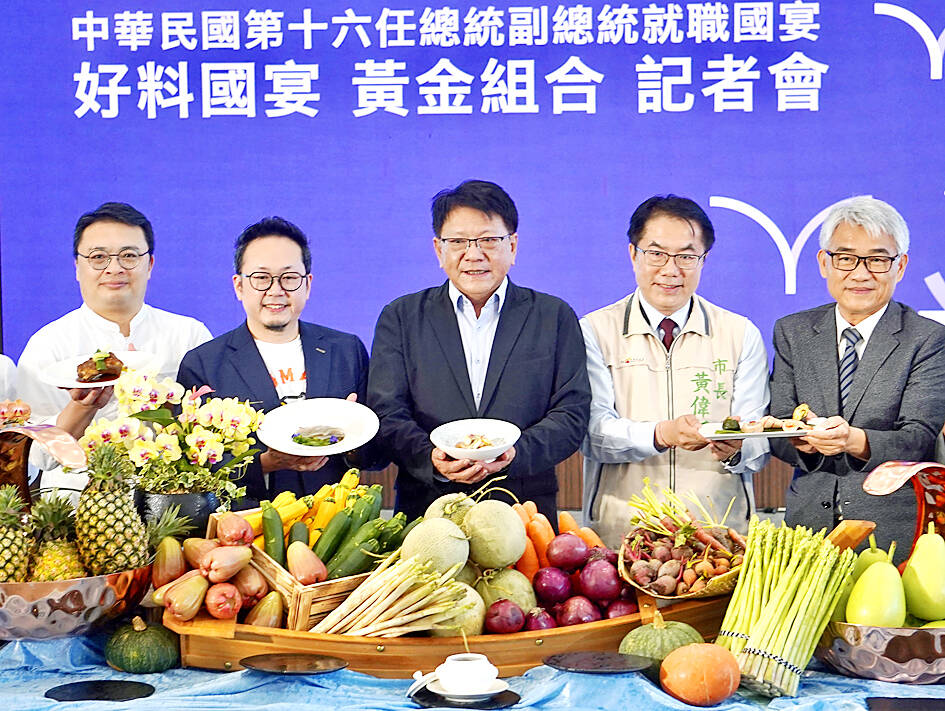Preparing for a state banquet reflecting Taiwan’s unique history, chef Wes Kuo (郭庭瑋) places delicate vegetable fronds around sauces inspired by the cuisines of its five major ethnic groups.
The dish is to be part of an eight-course feast full of symbolism to be served after William Lai (賴清德) is sworn in as president on Monday against a backdrop of increasing pressure from China.
Kuo said the banquet created by Taiwanese chefs and food critics mirrors the nation’s identity.

Photo: CNA
“We put together Taiwan’s seasonal produce on one plate, paired with five different sauces, to represent the flavor of each ethnic group,” Kuo said as he practiced the dish in his Taipei restaurant, Embers.
The sauces paint a vivid picture.
Fermented tofu paste — often found in Taiwanese dishes — sits alongside a kumquat concoction popular with Taiwan’s Hakka community.
There is also a satay sauce similar to Southeast Asian cuisines, with a spot of chilli for a kick. A finishing touch are crystal-clear drops of Te’nas — made with sea salt, chilli and water — which comes from the Amis people.
The sauces “blend very well when eaten together,” Kuo said.
Food critic Jewel Tsai (蔡珠兒) said the banquet tells the story of Taiwan and its most important elements of “freedom, democracy and diversity.”
The dinner is to be held in Tainan, where Lai previously served as mayor.
Dignitaries expected to attend include former officials from the US, as well as leaders from its diplomatic allies.
Long before the Chinese Nationalist Party (KMT) fled to Taiwan after the Chinese Communist Party gained control of China in 1949, Taiwan’s cultural identity had been shaped over centuries by indigenous people, as well as Chinese, European and Japanese rulers.
As Taiwan moved from autocracy to democracy by the 1990s, the population — which had been educated under a Chinese curriculum — began to develop a distinct identity.
“Many ordinary people felt that they were suppressed or repressed in the past, so if they can show the food of common people, this will be connected with the local identity,” said Chen Yu-jen (陳玉箴), a Taiwan food historian. “Taiwanese people are very confident in their own food and culture ... it has developed into a political symbol.”
Lai’s inauguration menu also features a chicken soup common in small eateries, as well as bubble milk tea — a drink usually loaded with milk, sugar and tapioca pearls.
A fish dish of yellowfin bream is to be served with an aromatic tana herb and pepper sauce, drawn from traditional indigenous cooking.
Lai himself has requested a sweet potato and kumquat roll from a favorite rural restaurant in his northern birthplace of New Taipei City’s Wanli District (萬里).
“He likes sweet food and it just suits his taste,” said Tung Shih-min, owner of Jiu Zhuang Mei Shi restaurant, as his staff prepared 1,000 rolls.
Kuo said that including everyday street snacks like the sweet roll in the fine dining banquet represented Taiwan’s acceptance of different cultures and ways of life.
“I think this is the most important value of democracy — no exclusivity,” he said.

Chinese Nationalist Party (KMT) Chairman Eric Chu (朱立倫), spokeswoman Yang Chih-yu (楊智伃) and Legislator Hsieh Lung-chieh (謝龍介) would be summoned by police for questioning for leading an illegal assembly on Thursday evening last week, Minister of the Interior Liu Shyh-fang (劉世芳) said today. The three KMT officials led an assembly outside the Taipei City Prosecutors’ Office, a restricted area where public assembly is not allowed, protesting the questioning of several KMT staff and searches of KMT headquarters and offices in a recall petition forgery case. Chu, Yang and Hsieh are all suspected of contravening the Assembly and Parade Act (集會遊行法) by holding

PRAISE: Japanese visitor Takashi Kubota said the Taiwanese temple architecture images showcased in the AI Art Gallery were the most impressive displays he saw Taiwan does not have an official pavilion at the World Expo in Osaka, Japan, because of its diplomatic predicament, but the government-backed Tech World pavilion is drawing interest with its unique recreations of works by Taiwanese artists. The pavilion features an artificial intelligence (AI)-based art gallery showcasing works of famous Taiwanese artists from the Japanese colonial period using innovative technologies. Among its main simulated displays are Eastern gouache paintings by Chen Chin (陳進), Lin Yu-shan (林玉山) and Kuo Hsueh-hu (郭雪湖), who were the three young Taiwanese painters selected for the East Asian Painting exhibition in 1927. Gouache is a water-based

Taiwan would welcome the return of Honduras as a diplomatic ally if its next president decides to make such a move, Minister of Foreign Affairs Lin Chia-lung (林佳龍) said yesterday. “Of course, we would welcome Honduras if they want to restore diplomatic ties with Taiwan after their elections,” Lin said at a meeting of the legislature’s Foreign Affairs and National Defense Committee, when asked to comment on statements made by two of the three Honduran presidential candidates during the presidential campaign in the Central American country. Taiwan is paying close attention to the region as a whole in the wake of a

OFF-TARGET: More than 30,000 participants were expected to take part in the Games next month, but only 6,550 foreign and 19,400 Taiwanese athletes have registered Taipei city councilors yesterday blasted the organizers of next month’s World Masters Games over sudden timetable and venue changes, which they said have caused thousands of participants to back out of the international sporting event, among other organizational issues. They also cited visa delays and political interference by China as reasons many foreign athletes are requesting refunds for the event, to be held from May 17 to 30. Jointly organized by the Taipei and New Taipei City governments, the games have been rocked by numerous controversies since preparations began in 2020. Taipei City Councilor Lin Yen-feng (林延鳳) said yesterday that new measures by